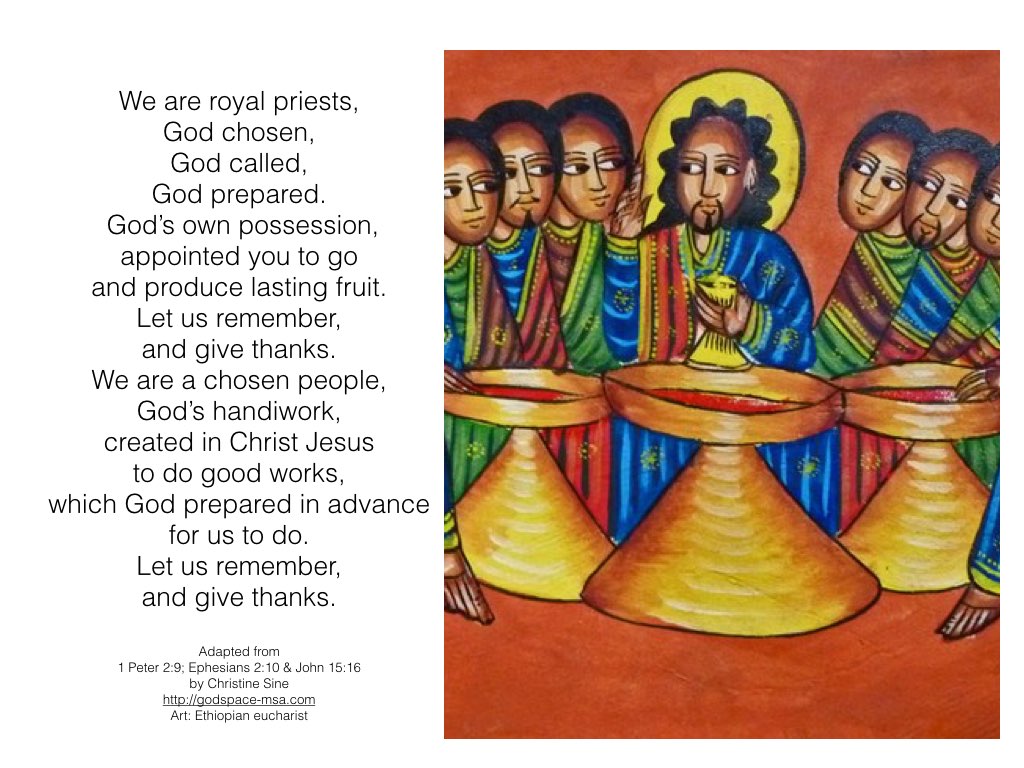
you are a chosen people. You are royal priests, a holy nation, God’s very own possession. As a result, you can show others the goodness of God, for he called you out of the darkness into his wonderful light. 1 Peter 2:9 NLT
Chosen people – it makes us all feel so special. But why did God choose us? As I gathered my stones last week I thought about that. God chooses slaves and prostitutes and misfits to be his followers. I did not choose stones because they were unique or special either. The seven I ended up with were no different than the ones I left behind. I chose them for their diversity of colour, their size, their texture and their aesthetic beauty. They looked good together. They fitted comfortably in the palm of my hand and they were all nice and smooth. Not special in that they were unique, but special because I chose to make them special.
We are special because God chooses to make us special too. God chooses us because God wants someone of a particular shape and size, with particular talents and the ability to fit together with the other people chosen at the same time. And tomorrow God will come and choose someone else, someone just as special and unique as we are. God will keep choosing special people until all the people in the world are chosen. We will be chosen to fit together comfortably in God’s hand, for specific tasks and special purposes. We will be chosen for our diversity, our size, our shape, and because we fit well together. We will be chosen because we fit a unique niche in God’s family.
What is your response:
Why do you think God chose you? Look at yourself in the mirror. What is it about your appearance, your gifts, your abilities that encouraged God to choose you? Now think about the people God has placed you with. Why do you think God chose them to be together with you? What is the unique niche that you fill both as individuals and as a community?
You didn’t choose me. I chose you. I appointed you to go and produce lasting fruit, (John 15:16)
For we are God’s handiwork, created in Christ Jesus to do good works, which God prepared in advance for us to do. (Ephesians 2:10 NIV)
We are chosen for a purpose, to do good works and to produce fruit, and like any fruit producing tree, the fruit is meant to be shared for the nourishment of others. The Israelites were chosen to be a blessing to all nations. Disciples of Christ are chosen to show compassion and generosity and love.
What is your response:
Sit quietly before God with your eyes closed. Listen to the music below. Think about your life. What do you think are the good works God chose you to perform?
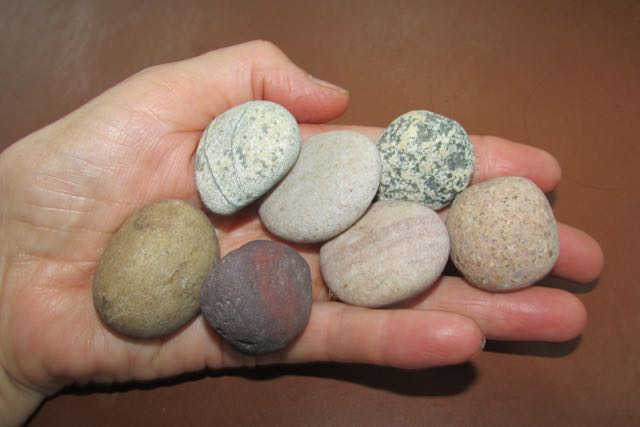
Last Saturday, as I mentioned in my Wednesday post, was a noticing day for me. Part of what I noticed was the river stones in the French drain in front of our property. It wasn’t long before I was picking up rocks, initially at random, but then I thought: What if I made a collection of rocks as a meditative focus? Suddenly my gathering not only acquired purpose, but focus, and in the finding of that focus my noticing ratcheted up to a new level.
Now that I am home, I have intentionally placed my stones in a place where I will notice them throughout the day and the week, recognizing that they not only provide a focus but also signify my receptivity to the voice of God. In gathering these stones I invite God to speak to me in a fresh way. It has been an exciting and inspirational experience and one that I hope you will join me in. God has placed three words on my heart that will provide meditations for this coming week: chosen; washed; shaped.
When we notice something that becomes a focus for our meditation it always heightens our noticing and sharpens our minds. Intentional noticing gives us x-ray eyes not just into the object of our noticing but into our own lives and often into our faith as well.
There are three simple rules for creating a meditation ritual:
1. Keep it simple.
2. Make it meaningful.
3. Stick to it.
What have you noticed this week that could be come a focus for meditation?
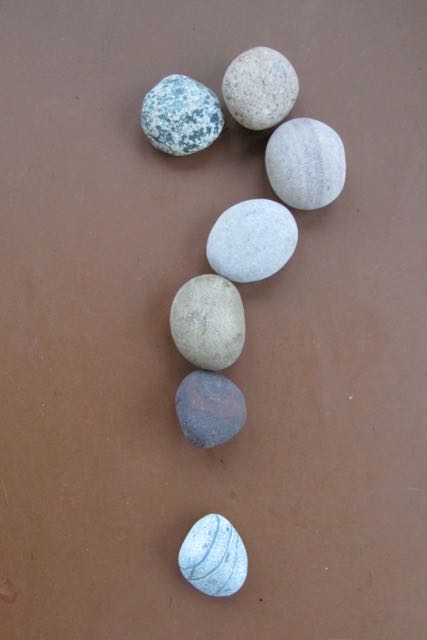
Walk around your house, garden and/or neighbourhood and gather items that catch your attention. Place them on your desk, in your prayer space or work space in a way that encourages you to notice them throughout the week. Arrange them so that they will catch your attention throughout the day.
Prayerfully invite God into your process of reflection. There might be a specific question your are grappling with that you want to focus on. Keep a journal by your objects and write that question at the top of the page. Return to it several times during the day. Allow God to speak to you through them and remember: Keep it simple, make it meaningful and stick to it.
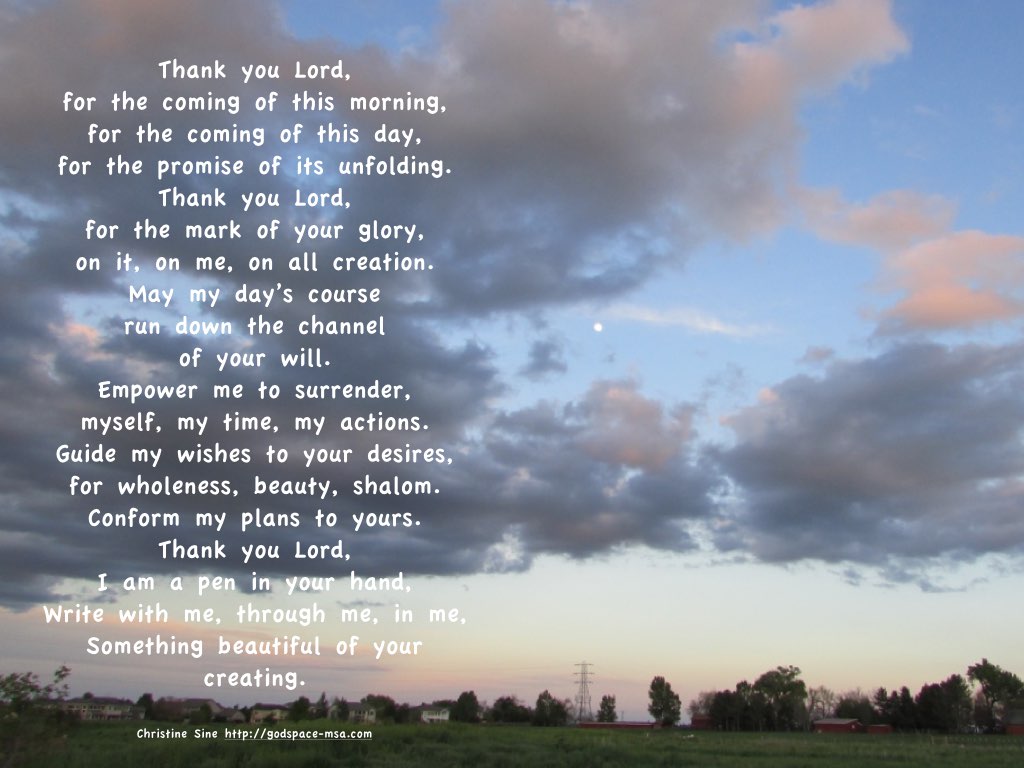 I am working on a new set of prayer cards that will provide prayers for different times of the day – morning and night plus three times to pause and reflect throughout the day. The prayer above is one that I have written specifically for this. I plan to add a simple reflection on the back of each card. There will be 10 prayer cards in the set which gives some choice for which ones to use on any specific day.
I am working on a new set of prayer cards that will provide prayers for different times of the day – morning and night plus three times to pause and reflect throughout the day. The prayer above is one that I have written specifically for this. I plan to add a simple reflection on the back of each card. There will be 10 prayer cards in the set which gives some choice for which ones to use on any specific day.
I hope to have these ready by the end of September. Any suggestions on which prayers to include is appreciated as well as other thoughts or comments you might have on this project.
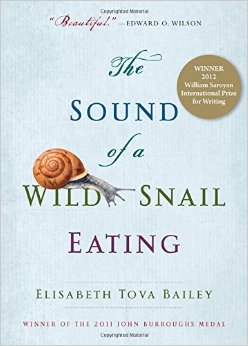
When an illness keeps her bedridden, Elizabeth Tova Bailey watches a wild snail that has taken up residence in a violet on her nightstand. As a result, she discovers the solace and sense of wonder that an often unnoticed and unappreciated creature like this can bring. In the process she discovers a greater understanding of her own confined place in the world and an appreciation of what it means to be alive.
The Sound of a Wild Snail Eating is a delightful book that intrigued me from the moment it was recommended by my friend Betty Sue Brewster. A snail eating makes a sound? It had never even occurred to me, like so much of the wisdom in this book. I gained an abundance of time Elizabeth comments at one point, It was perplexing how in losing health I had gained something so coveted but to so little purpose. (38).
Yes I thought – we covet our time yet waste so much of it in useless or unimportant activities. In an effort to gain time, a totally impossible effort I might add because we cannot make the clock stand still, we multitask and actually waste more time. Research suggests that multitasking not only makes us less productive, it makes us dumber.
Elizabeth is possibly the first person to record observations of a snail tending its eggs, another remarkable feat that came from her ordeal. That illness could provide any kind of “first” in the scientific world seemed remarkable at first, but when I though about my own observations of what I miss because I am going too fast or getting too distracted, I was not surprised any more. Its the little things of life that happen at a snail’s pace (pardon the pun) that often hide the most monumental discoveries.
Interspersed with excerpts about snails from studies, essays, and poetry, and plumped up with tales of snail fascination dating back to the Romans, Elizabeth’s book is as richly layered as the soil she lays down in the snail’s terrarium: loamy, potent, and regenerative.
This is a story of courage and resilience in the facing of an extremely difficult ordeal. More than that it is a heartwarming story of observation and reflection that shows the wonder of learning about life in all circumstances.
The Sound of a Wild Snail Eating is not just a book for those of us that love the natural world. It is a book for all who struggle to find meaning in life and who need the patience to endure when life is challenging.
I love this book trailer – complete with, you guessed it, the sound of a wild snail eating. It is a meditative reflection in itself. Enjoy!

Last Saturday I went out to Camano Island intending to pick cherries, but the birds had beaten me to it. There was not a single cherry left on our trees. It made me angry and frustrated. Not only had I lost control of my day, but what on earth would I do with my time?
Then I remembered last Monday‘s meditation: Rest in the Moment with the reminder to savour the beauty, inhale its fragrance and listen to its music. Time to take notice of my own advice, I thought as I took some deep breaths, started to relax and looked around me with suddenly noticing eyes. There was so much that had eluded me before. In my hunt for cherries I had failed to notice the blackberry bushes already laden with lush berries, the promise of a rich harvest to come. And in the corner grape vines growing rapidly with fruit just forming. By the back door a wild rose with large fragrant blooms.
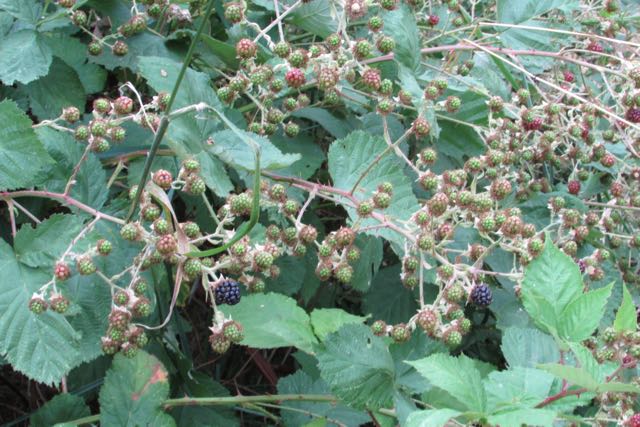
So my cherry picking became berry picking, and there nestled amongst the brambles was a blue dragonfly, sitting waiting for me to gasp in awe at its beauty. I looked through its translucent wings, to the berries behind, gently moving the stem to get a better look. I have never seen anything so magnificent. God’s creation is translucent, I thought, the glory of God shines through it.
Now in a noticing mood, I headed out front and allowed my attention to be caught by the river stones formed into a French drain. I chose several that I thought would be good for reflecting on and stowed them away in a bag to take home. Food for further thought, I realized as I later placed them on my desk.

Still in that noticing mood, with my eyes now wide open to God’s nudges, I headed out to the Mustard Seed Village site to evaluate the extent of the vandalism and the amount of work necessary for us to use the building for the upcoming Celtic retreat. A large thistle bush growing up through one pile of broken glass riveted my attention. Thistles, I remembered are often the first plants to grow in poor and polluted soil. They can reach down up to 20 feet to draw up nutrients, breaking down the soil, enriching it, making it healthy so that other plants can thrive. Another symbol of hope for the future I realized.
God keeps giving us hope, yet we can so easily miss the signs if our eyes are not open to notice. At the end of last year’s retreat, some of you may remember, as Andy Wade and I talked about previous acts of vandalism, I walked behind the altar, and there in the grass was a rusty old piece of junk that looked just like a Celtic cross. For me it was a symbol of hope – a sense that God says to us Garbage into gold. I can redeem and make new all that is created.
Hope is in the air. I feel it as I rest in this moment of God’s creating. I experience it as I notice the many reassuring nudges of God’s spirit as we prepare for this year’s Celtic retreat. I am bathed in it, as we move forward slowly into God’s plans for us for the coming months.
What have you noticed today that gives you hope and reassurance?
What has distracted you from noticing God’s signs of hope?

A couple of weeks ago I shared the Welcoming prayer by Thomas Keating. One of the lines in that prayer is I let go of my desire for power and control. These are hard words for all of us to adhere to as we love to be in control, even in the small things.
We want to control what the day holds, stick to our schedules and not allow anything to disrupt our well thought out plans. We want to control relationships, often attempting to manipulate friends and family so that we get what we want from them. When people don’t respond in the expected way we often get angry because we have lost control.
We want to control ourselves too. We exercise, eat, pray and work so that life can be good and follow certain patterns. Losing control is scary for us because it pushes us into the unknown, but it here that we come to know the unknowable God.
What if we allowed ourselves to let go and trusted in God instead? What if we admitted that we don’t know the answers and that we don’t always know what is best? What if we let go and let God? That is the path to freedom.
1. It frees us of unnecessary worries. The desire for control adds so many worries to our lives – worries about how we look, how people perceive us, what we should accomplish in a day. Many of us are driven to accomplish far more than we should because we are afraid of the consequences of losing control.
2. It frees us to be seen as we really are. We sometimes try to control a situation by telling people what we think they want to hear rather than what we really believe. We want them to like us, or think us important, or knowledgeable. To be ourselves we must be willing to lose control of what people think of us. Yet to honest people are more likely to like us when we are honest even when they don’t agree with what we say.
3. It frees you to live in the present moment rather than in the past or the future. Being in control blinds us to the beauty around us because we think we know what is going to happen. It proscribes our choices and limits our options. Letting go relaxes us, gives more space to the moment and allows us to see the world around us clearly.
4. It frees us to listen to the spirit of God. The moment we let go of our desire for control, we can allow the spirit to guide us but that is indeed a journey into the unknown.
5. It frees us to enjoy the unexpected surprises and spontaneity of life. When we let go, we are liberated from the rigidity of life as we think it should be and freed to experience life as it can be. It is like taking off a constricting corset and allowing ourselves to breathe deeply.
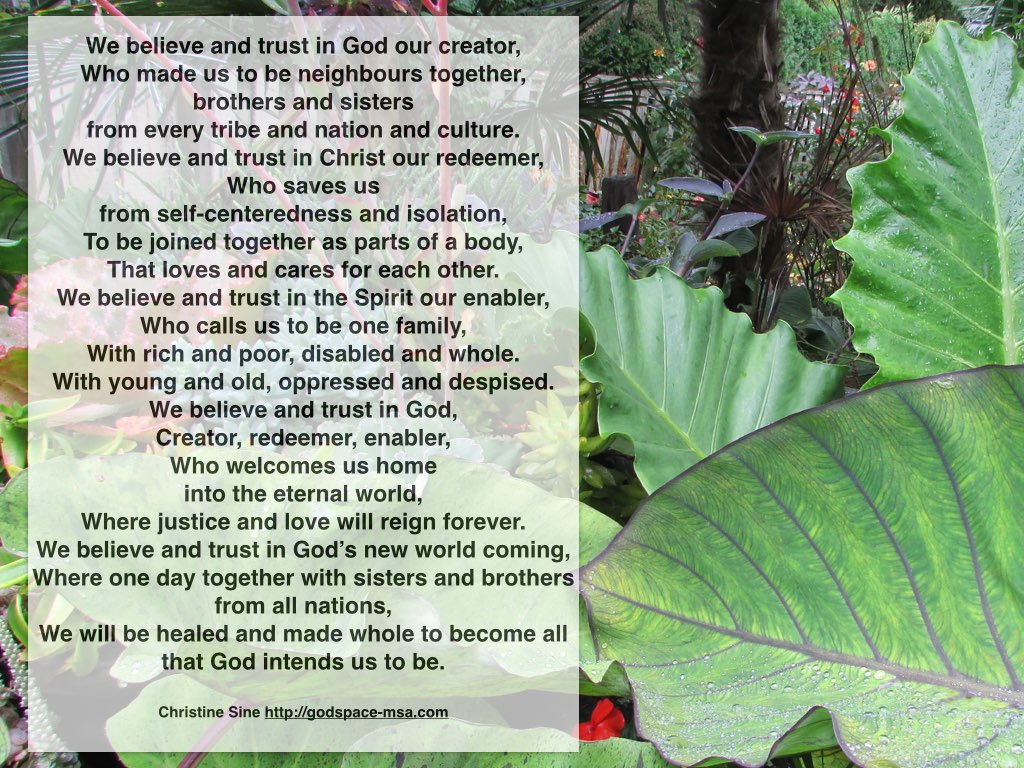
I still vividly remember my visit to Australia some years ago to spend some time with my Mum after she had back surgery for a collapsed spine. A steel rod in her back strengthened the existing structure and returned some of its youthful vitality. She looked years younger, her face was less stressed and she gained two inches in height. Watching her walk straight and tall for the first time for years was wonderful. It was sobering however to realize that even though she has two sons, a daughter and a daughter in law who are doctors, no one really noticed what was happening or the severity of her problem.
Have we too lost our backbones and no one has noticed? Has the strength and vitality of our faith collapsed diminishing us to a mere shell of what God intends us to be? What are the things that contribute the iron and steel that makes us stand straight and tall in the presence of God and of those around us?
What is Your Response:
Take time to reflect on your faith. Make a list of the core beliefs of your faith, the spiritual practices that nurture those beliefs the daily, weekly and yearly activities reflect these beliefs. Look over the list and prayerfully consider: Is your faith strong and vibrant or weak and frail? What provides the iron and steel you need to grow your faith into the future?
If you can, set aside a retreat day to read through this spiritual audit and allow God to speak to you about your faith. What actions could you take to strengthen your backbone?
Creating a personal creed that gives zest and vigour to our faith is a great way to strengthen our spiritual backbones. The less confident we are of our core beliefs, the more likely we are to focus on holier than thou practices to define us. Whether we drink, smoke or condone same sex marriages, whether we call God father, mother or Eternal One, are not central to our faith but we often treat them as though they are. It is these non essentials we use to separate us from other believers. They become our litmus test to decide who is and who isn’t a part of the body of Christ.
I wrote the prayer above as a personal creed, after reflecting on my own beliefs. It provides a statement that I can return to whenever I feel insecure in my faith. Its a little like a calling statement but with a little more detail about what we believe rather than what we want to do with our lives.
What is Your Response:
Read through the Nicene Creed and Apostles’ Creed and listen to the two versions of the Apostles’ creed in this post. In what ways do these statements reflect your own beliefs? What would you like to add or subtract? Use them as a foundation for writing your own creed. You may want to memorize it, but more importantly, you need to read through this creed regularly so that you are confident in what you believe.
As an Amazon Associate, I receive a small amount for purchases made through appropriate links.
Thank you for supporting Godspace in this way.
When referencing or quoting Godspace Light, please be sure to include the Author (Christine Sine unless otherwise noted), the Title of the article or resource, the Source link where appropriate, and ©Godspacelight.com. Thank you!
